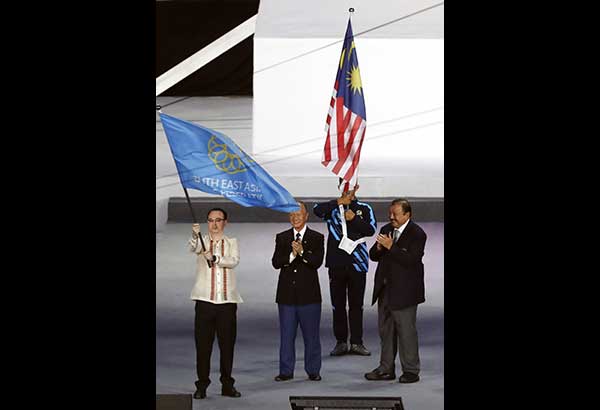SEA Games champs ready for Worlds

Philippines’ Foreign Minister Alan Peter Cayetano, left, waves the SEA Games federation flag during the closing ceremony of the 29th South East Asian Games in Kuala Lumpur, Malaysia. The Philippines will be the host country for 2019 30th SEA Games. AP
KUALA LUMPUR – The 29th Southeast Asian Games came to a dramatic close for a Malaysian host that reigned supreme for the second time in 40 years and a staggering finish for a scrappy Philippine contingent for the second straight time.
The national stadium, the site of many triumphs and travails for the victors as well as an injured Philippine athletics team, came alive one last time as fireworks exploded into the sky and sportsmen of all sizes and gender, creed and color, language and character partied into the night with only a few things in common – athleticism, camaraderie, passion and compassion, the spirit of being young – which have been the meaning of the Games.
Malaysians as well as guests from the 10 other nations from Southeast Asia saw all these and many more in a contingent of 800 Malaysian athletes who regaled them everywhere with their dynamic performances in every game, every match, every set even if they were losing, in the far-flung venues of equestrian in Waring where their millionaires watched a Malaysian lose to the Fil-Am-led equestrian team and the highways of Putra Jaya where they trailed Filipino triathletes and a marathoner to the finish line.
On the highest platforms of diving, Malaysian boys and girls executed seemingly simple routines with the highest degree of difficulty earning them roars of applause and the highest accolade worthy of Olympians.
They have gained the nod of international judges. They are ready for the larger stages.
Their cyclists, training in the US and Australia and in the dizzying heights of Genting Highlands and Langkawi, also gave a first-hand demonstration of their world-class act, winning 13 of 20 in the sport on and off the road. They are ripe to become Olympic and world champions.
The Thais descended on this country of 31 million, fascinating audiences with their exciting styles in tennis, hoping to reach the heights where at one time stood Thai legend Paradorn Srichapan, a SEA Games veteran who was the first Asian to oust Rafael Nadal in a grand slam tournament and once ranked No. 9 in the world.
Indonesia paraded its awesome position as a world power in badminton and Olympic gold medal winner in weightlifting.
Vietnam continued its domination in the martial arts, from karate, judo, taekwondo and wushu including the art forms of these sports which have brought them honors on the world stage.
The Philippines won the gold that weighed more than all the other golds with its unquestioned supremacy in basketball, made possible by the country’s Team B, the Gilas Cadets who hold the promise of pursuing the country’s golden hopes in the Asian Games and beyond.
The boxing association was disappointed with a mere two-gold output. That contribution, however, tied that of Thailand, the home of Southeast Asia’s Olympic gold medal winners, and the showdown between the two countries in the semis and finals only emphasized the seriousness of purpose of the boxing association which is looking at bigger things in the Asian Games next year, the 2019 SEA Games in Manila and the 2020 Olympics in Tokyo.
The title, the second for Malaysia since it hosted the 2001 Games, was at the center of a nationwide celebration commemorating 60 years of independence from British rule.
It was the second most tragic finish for the Philippines, which had 29 golds in 2013 and 2015 and was again at sixth place, below the top 5 among 11 sporting nations.
Athletes assembled as members of their own sports, posed for selfies and exchanged shirts in a night of celebration under a flood of lights and an explosion of colors before the SEAG light was extinguished from the cauldron.
In simple ceremonies, the host country handed the SEAG flag to the next host, the Philippines, minus the trimmings, unlike others. The Filipino sports officials dispensed with elaborate turn-over rites, an P8.1 million choreographed presentation welcoming the ASEAN to Manila in 2019.
- Latest
- Trending





























